Class 6 Mathematics Chapter 3 |
Playing with Numbers | Exercise 3.5
Question 1: Which of the following statements are true:
(a) If a number is divisible by 3, it must be divisible by 9.
(b) If a number is divisible by 9, it must be divisible by 3.
(c) If a number is divisible by 18, it must be divisible by both 3 and 6.
(d) If a number is divisible by 9 and 10 both, then it must be divisible by 90.
(e) If two numbers are co-primes, at least one of them must be prime.
(f) All numbers which are divisible by 4 must also by divisible by 8.
(g) All numbers which are divisible by 8 must also by divisible by 4.
(h) If a number is exactly divides two numbers separately, it must exactly divide their sum.
(i) If a number is exactly divides the sum of two numbers, it must exactly divide the two numbers separately.
Answer 1: Statements (b), (c), (d), (g) and (h) are true.
Question 2: Here are two different factor trees for 60. Write the missing numbers.
Answer :
Question 3: Which factors are not included in the prime factorisation of a composite number?
Answer 3: 1 is the factor which is not included in the prime factorisation of a composite number.
Question 4: Write the greatest 4-digit number and express it in terms of its prime factors.
Answer 4: The greatest 4-digit number = 9999
Question 5: Write the smallest 5-digit number and express it in terms of its prime factors. Answer 5: The smallest five digit number is 10000.
Answer 5:
The prime factors of 10000 are 2 × 2 × 2 × 2 × 5 × 5 × 5 × 5.
Question 6: Find all the prime factors of 1729 and arrange them in ascending order. Now state the relation, if any, between, two consecutive prime numbers.
Answer 6: Prime factors of 1729 are 7 × 13 × 19.
The difference of two consecutive prime factors is 6.
Question 7: The product of three consecutive numbers is always divisible by 6. Verify this statement with the help of some examples.
Answer 7: (i) 2 x 3 x 4 = 24 which is divisible by 6
(ii) 4 x 5 x 6 = 120 which is divisible by 6
(iii) 9 × 10 × 11= 990 which is divisible by 6
Question 8: The sum of two consecutive odd numbers is always divisible by 4. Verify this statement with the help of some examples.
Answer 8: 3 + 5 = 8 and 8 is divisible by 4.
5 + 7 = 12 and 12 is divisible by 4.
7 + 9 = 16 and 16 is divisible by 4.
9 + 11 = 20 and 20 is divisible by 4.
Question 9: In which of the following expressions, prime factorisation has been done:
(a) 24 = 2 x 3 x 4
(b) 56 = 7 x 2 x 2 x 2
(c) 70 = 2 x 5 x 7
(d) 54 = 2 x 3 x 9
Answer 9: In expressions (b) and (c), prime factorisation has been done.
Question 10: Determine if 25110 is divisible by 45. [Hint: 5 and 9 are co-prime numbers. Test the divisibility of the number by 5 and 9.]
Answer 10: The prime factorisation of 45 = 5 x 9
Factors of 5 =1,5
Factors of 9 = 1,3,9
25110 is divisible by 5 as ‘0’ is at its unit place.
25110 is divisible by 9 as sum of digits is divisible by 9.
Since the number is divisible both by 5 and 9 both, it is divisible by 45.
Question 11: 18 is divisible by both 2 and 3. It is also divisible by 2 x 3 = 6. Similarly, a number is divisible by 4 and 6. Can we say that the number must be divisible by 4 x 6 = 24? If not, give an example to justify your answer.
Answer 11: No. it is not necessary because 12 and 36 are divisible by 4 and 6 both, but are not divisible by 24.
Question 12: I am the smallest number, having four different prime factors. Can you find me?
Answer 12: The smallest four prime numbers are 2, 3, 5 and 7.
Hence, the required number is 2 x 3 x 5 x 7 = 210
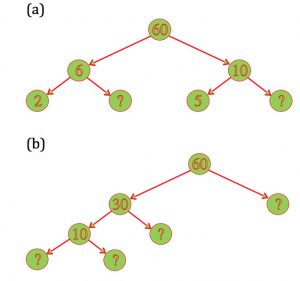
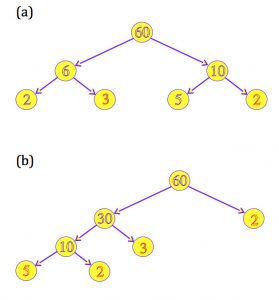
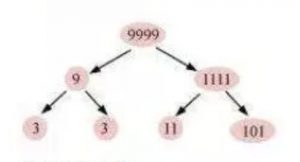
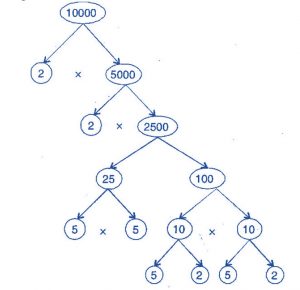
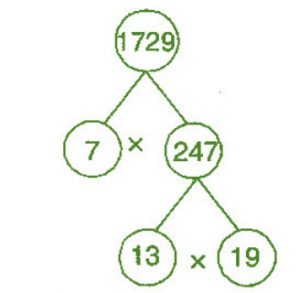
Leave a Reply